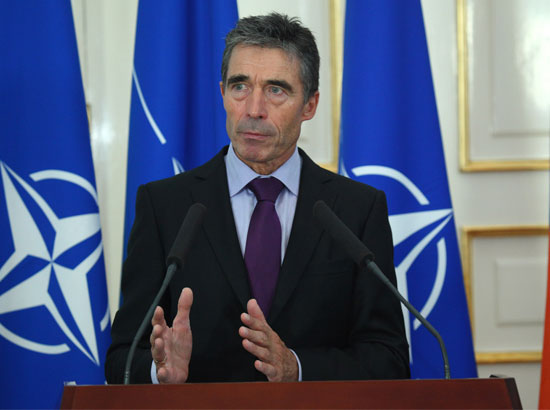
From Anders Fogh Rasmussen, NATO: All Allies share the same fundamental values of liberty, democracy, the rule of law, and respect for human rights. And the Allies are prepared to act to defend these values whenever necessary.
We see that commitment today in many places around the globe, where we have operations under the mandate of the United Nations. In Afghanistan, where we are working to make sure that the country can never again be a safe haven for terrorists. In Kosovo, where we continue to help provide a safe environment for all communities. In the Indian Ocean where we help to ensure free passage for ships facing the threat of piracy. And last year over Libya, where we prevented a massacre and helped protect civilians from attack.
In everything we do – politically and operationally – we have found that the keys to success are consensus and cooperation. Some Allies are large, like the United States. Others are smaller, like my own country, Denmark. But every decision in NATO is taken by consensus. This means that all Allies, regardless of their size, must agree. And it means all Allies have an equal voice.
From time to time, we do have disagreements. But we work through them like true friends. We talk – a lot. Eventually, we compromise. And we come to an agreement that all of us can live with. It’s not always easy. But we do it every day.
And it’s a virtuous circle. Cooperation requires dialogue. Dialogue brings compromise. Compromise permits cooperation. And cooperation enhances our security.
It is this approach that has made NATO the most successful Alliance in history. But of course, we do not live in history. We must face the threats of the future, not the past. Our times are changing. Our challenges are changing. And NATO is constantly changing to meet them.
Over the past two decades, we have come to understand that the simple physical defence of our populations and territories is not enough. Tanks massed on borders can no longer guarantee our security. New threats are too complex, too interconnected, and too unpredictable. They require a different approach.
Challenges like terrorism, cyber warfare, or the proliferation of weapons of mass destruction cannot be confronted by any one army, any one country, or even NATO acting alone. They require teamwork across borders, across regions, and even across cultures.
That’s why achieving security in the 21st century must be a truly cooperative endeavour. We need partners – here, in this region, and across the world – partners who share our values and our desire for security.
Excerpts from speech by NATO Secretary General Anders Fogh Rasmussen at the Yerevan State University in Yerevan, Armenia. (photo: PanArmenian Photo)
Image: PanArmenian%20Photo%209%206%2012%20Rasmussen.jpg
